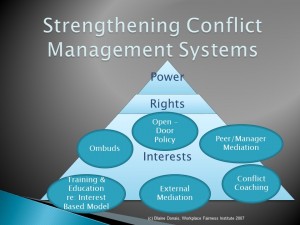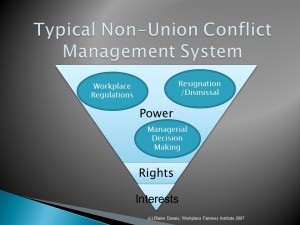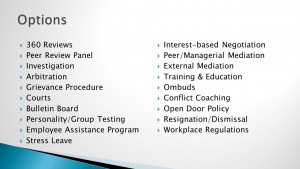I’ve worked with many organizations and groups over the years to determine and resolve challenges…

Helpless & Powerless in Conflict
We are often the ones asking the questions. Michelle had the tables turned on her last week when she was interviewed by a PhD student. It is interesting how such an event serves to clarify and focus your thinking, even on a subject you know well.
As part of a study on a culture of respect in the workplace, and with a focus on bullying, Michelle was asked, among other things “What have you seen work best to maintain a culture of humanistic respect in the workplace?” It led her to thinking about systems.
Every organization has a conflict management system, though often they may not recognize it. Even no formal structure is a system. The first stop for many employees when they find themselves in unresolvable, unproductive conflict is their manager. Human Resources is for most the next logical step. If these steps are not successful, they are often at a loss. Barriers for seeking other options include a fear of judgment, loss of privacy, or often a sense of helplessness or powerlessness. “This situation cannot be resolved!”
 Informal discussion with a manager or HR Advisor which helps all parties build understanding and reach a mutual resolution is an example of an interest-based option. If the manager or HR steps in to force a solution (such as moving the employee to another department) they are employing a power-based option.
Informal discussion with a manager or HR Advisor which helps all parties build understanding and reach a mutual resolution is an example of an interest-based option. If the manager or HR steps in to force a solution (such as moving the employee to another department) they are employing a power-based option.
An employee may choose or be invited to file a complaint or grievance for bullying or disrespect. This rights-based process is important when policies and procedures and/or employees’ rights are compromised.
Organizations must find the correct balance between interest-based, power-based, and rights-based processes to ensure fairness and equity in the resolution of workplace conflict. The organization with under-developed conflict management systems which relies too heavily on rights-based  processes often fosters a workforce with a culture of fear of reprisals and loss of engagement.
processes often fosters a workforce with a culture of fear of reprisals and loss of engagement.
Similarly, the over-use of the power-based process can result in a negative and helpless culture. When we see organizations in these traps, we meet employees who project their problem onto management and abdicate any responsibility for owning and solving it themselves.
Interest-based approaches are not the panacea either. Over-reliance on interest-based process may result in a culture inefficiently “run by committee” or where real action against bullying is not taken when required. Training in respect is an interest-based option which is often a go-to solution. It won’t work with employees who feel they are not heard, do not have any rights, or are being forced.
Seeking balance, and offering a multitude of options for employees in all three paradigms is critical for success and a positive, fair, and healthy working environment. Often, the correct solution is a combination of all three types, done at different times and in different ways. Consider the options, and plug the right solution into the right holes. Your employees will thank you.

Receive The Conflict Toolbox Series
The conflict toolbox series is a series of four emails with each one including a tool for your conflict resolution toolbox. After we send you the four tools, we will send you our monthly newsletter. We will always ask before sending anything else!



